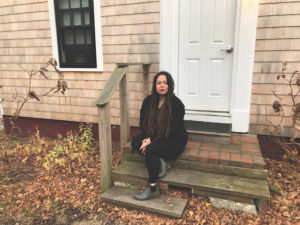Last spring, Joy Priest had some big decisions to make. The Kentucky native, who had recently completed her M.F.A. in poetry at the University of South Carolina, was accepted to the University of Houston’s Ph.D. program in creative writing, the Wallace Stegner Fellowship, and the Fine Arts Work Center’s writing fellowship. Most emerging writers dream of getting into even one such prestigious program, yet Priest found herself having to pick among three. After consulting with her mentors and weighing her options, Priest chose to come to Provincetown, a place she’d fallen in love with a few years earlier when she came for a summer workshop.

The good news continued. Just a month later, as Priest was making preparations to spend seven months on Cape Cod, she found out that her debut poetry collection, Horsepower, had won the Donald Hall Prize for Poetry from the Association of Writers & Writing Programs. It was only the second contest to which she’d sent her book. Such a surfeit of success “was overwhelming,” Priest says. “My life exploded.”
The contest judge, former U.S. Poet Laureate and Pulitzer Prize winner Natasha Trethewey, praised Priest’s manuscript for “a captivating display of might and elegance” and called Priest’s writing “a language of astonishing sinew.” Horsepower will be published by the University of Pittsburgh Press in late 2020.
Priest will give a reading at the Fine Arts Work Center on Thursday, Dec. 12, along with another writing fellow, Gbolahan Adeola. She will feature poems from Horsepower and some newer works as well.
Priest describes Horsepower as “a cinematic escape narrative” that travels through the memories of a “black girl speaker in the midst of a self-imposed exile.” The girl, who is of mixed race, raised by her white mother and racist grandfather, is deeply imprinted by Churchill Downs, the horse-racing track best known as the location of the Kentucky Derby. In the title poem, for example, she observes the horses as they “work the loop of that circular mile/ making everyone’s living except their own.” As the speaker considers her own vantage point on the world, the poem moves in and out of present and future tense as it defines the boundaries of home, neighborhood, and networks of kinship.
Other poems in the book, such as “American Honey,” investigate flight: “It’s easier than you thought — leaving…. For once you are a girl/ unmolested. You could do this: be a girl/ without a home.” Priest’s speaker finds power in claiming escape, and in inhabiting the liminal space between her girlhood self and being an adult woman narrator. Yet the reader is always aware that this point of view has been constructed along harshly segregated racial, gender, and economic divides, where naiveté or innocence is never an option.
Since Horsepower is already through the editorial process, Priest says she’s trying to make her seven months in Provincetown a time of exploration and creative rejuvenation. “When I got here, I started out thinking, what’s my idea? What’s my next project?” she says. She tried mapping out the poems for a second collection and setting ambitious writing goals. “But it just doesn’t work for me,” she says. Instead, Priest is approaching poems in a playful manner, experimenting with titles and formal constraints, such as writing sonnets and ghazels.
“The restraints of form give me momentum,” Priest says. “Even if it doesn’t end up in the form I started, it can be a prompt that gets me somewhere. Maybe it’s not a sonnet anymore over 24 drafts, but it may have this beautiful idea in it.”
She’s also reading voraciously, thanks to the Provincetown Public Library’s excellent interlibrary loan system, and getting to know the natural landscape of Cape Cod with the other fellows. “We go hiking a lot,” Priest says. “There’s a lot of fishing and foraging and harvesting shellfish.” Priest says that this year’s group of fellows is particularly close. “We have a group potluck three times a week,” she says.
The inclusion of both visual and writing fellows is unique to FAWC’s program. Priest says that collaboration with visual artists, as well as weekly printmaking workshops in FAWC’s studio, have been a huge part of her experience here. Visual arts fellow Johannes Barfield recorded one of her poems for a sound installation. With visual arts fellow Autumn Wallace, Priest is creating a series of broadsides featuring her poems.
“I always say poets are visual artists,” says Priest. She loves photography, crafts, and painting and says that visual arts are an important part of her practice: “I think if I wasn’t a poet, I’d spend most of my time painting.”
Priest says that the best part of being at FAWC is just talking to other fellows and living in a community of artists. It’s a different way of thinking about art than the academic program she just finished, which was theory-intensive. “The language of theory is ugly and it’s easy to get caught up in that,” she says. “I want to get back to the wonder of talking about poetry.”
Priest plans to pursue an academic career and will return to teaching next fall, once the fellowship is over. But for now, she’s enjoying the natural beauty of Cape Cod and the conversations and collaborations she’s experiencing at the work center. “I feel adventurous,” she says. “This whole fellowship is an adventure.”
Kentucky Unbound
The event: Reading by FAWC poetry fellow Joy Priest
The time: Thursday, Dec. 12, at 6 p.m.
The place: Fine Arts Work Center, 24 Pearl St., Provincetown
The cost: Free



